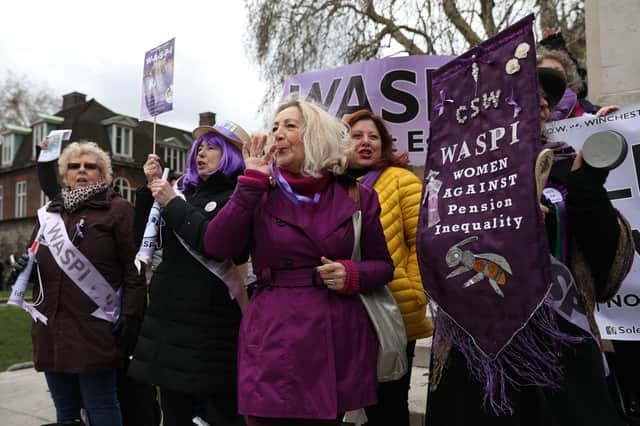WASPI pension campaigners issue 10-point list of demands to Ombudsman


Campaigners fighting for compensation for women affected by changes to state pension eligibility are calling on the Ombudsman to take notice of their ten-point list of demands as he compiles a report into the government’s handling of the issue.
Women Against State Pension Inequality (WASPI) is seeking justice for those born in the 1950s who had planned for retirement at 60 but were unable to claim the pension for at least another five years after that under two changes to age eligibility.
Advertisement
Hide AdAdvertisement
Hide AdAn initial stage of an Ombudsman’s report found that the Department of Work and Pensions (DWP) had committed maladministration by failing to write promptly to 3.6 million affected women.
The High Court has upheld WASPI’s claim that the second stage of an Ombudsman’s report into the DWP's handling of the issue was in part legally flawed. The campaign raised concerns about the Ombudsman’s approach to calculating the impact that maladministration had, which could make a big difference to the losses suffered.
That stage of the report has been quashed and must now be rewritten, along with the stage three draft which sets out the level of compensation that affected women will receive.
Angela Madden, who chairs the national WASPI organisation, told our sister title the Derbyshire Times: “WASPI now hope that the Ombudsman will get on with the report without further delay correcting the points which made his original efforts unlawful in line with the court agreement.
Advertisement
Hide AdAdvertisement
Hide Ad"We believe there are ten key steps that the Ombudsman must take now to produce a report that will not only be lawful, but helpful to Parliament in prompting rapid, straightforward and meaningful action to address the injustice 1950s’ women have experienced on a massive scale.”
1. Complete the investigation with a sense of urgency.
2. Clearly and correctly Identify when maladministration causing injustice began.
3. Clearly and correctly identify when maladministration causing injustice ended.
4. Reach a sound, principled conclusion on what would have happened had there been good administration, rather than maladministration, in the way 1950s-born women were notified of their State Pension Age.
5. Make realistic findings on direct financial losses.
6. Investigate the lost opportunities of women to make different financial decisions.
7. Properly gauge the distress, anger or hurt
8. Consider the impact of the injustices on women whose circumstances are different.
9. Reach conclusions in a fair manner, taking account of what 1950s-born women say.
10. Make recommendations for compensation for affected women generally that are fair and can be put into place rapidly.
WASPI is urging supporters to write to their MP, send them the ten-point list and remind them of their role in holding the Ombudsman to account.
Rishi Sunak said during Prime Minister’s Question Time recently that the government will “respond appropriately to any recommendations that come our way” after the Ombudsman has finished his investigation.